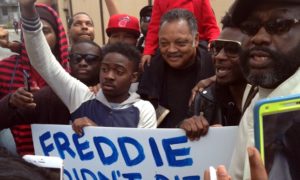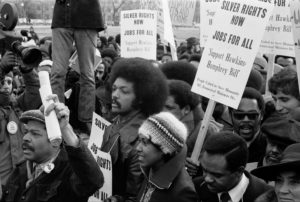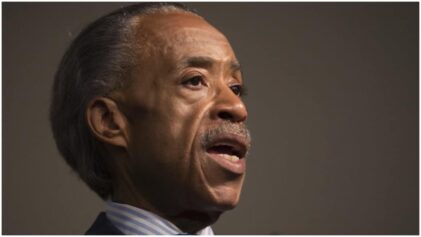The birth of a new #BlackLivesMatter movement to fight systemic racism provides an opportunity to examine both the similarities and the contrasts between the earlier civil rights struggles of the 1960s and the challenges facing Black people today.
Without question, there is a generational divide separating the characteristics, the tactics and the tone of the civil rights veterans and the emerging Black activists. This reality was brought to light when Steven W. Thrasher of The Guardian recently interviewed Rev. Jesse Jackson Sr. at the leader’s Chicago headquarters.
“There is a false narrative that the movement stopped and then started again,” Jackson said, in response to whether he is out of step with the #BlackLivesMatter movement. “We never stopped.”
Jackson insists that #BlackLivesMatter and #OccupyWallStreet are merely present-day continuations of the civil rights movement. Nevertheless, the 73-year old seems to have little interest or curiosity regarding the voices of the current movement, such as #BlackTwitter activist DeRay McKesson, and journalist/author Ta-Nehisi Coates, whose new book, Between the World and Me, has received much attention and critical acclaim for its keen insight on American race relations. Secular individuals such as Coates, an atheist, stand in marked contrast to Rev. Jackson and other civil rights figures who grew out of the church.
Thrasher points out that Jackson and others of his generation adhere to respectability politics, the notion that “liberation can only be achieved for and by people who are respectable enough to deserve it.” In his youth, Jackson, who worked with Dr. Martin Luther King, was associated with oppositional politics. However, in more recent years, with the advent of a new movement, elders such as Jackson have been aligned with respectability politics, and have built empires based on their dealings with corporations and the establishment.
Black Lives Matter—which has challenged and called out respectability politics and the ties that Black politicians have to a structurally racist political system—has engaged in a backlash against Jackson, Rev. Al Sharpton and the civil rights establishment. This comes as young Black men were being dismissed by elders such as Bill Cosby and the old guard civil rights groups, often lectured to, and told to pull their pants up rather than provided with any guidance or assistance. As a result, Alicia Garza, a co-founder of #BlackLivesMatter, said, “Ferguson marked the first time in my lifetime‚ in which the Reverends Al Sharpton and Jesse Jackson were begged to leave the scene of a civil rights crime.”
While Rev. Jackson’s generation may yet have something to contribute to young activists in terms of guidance and wisdom, advice and counsel, it is important to acknowledge the rift—which may be irreparable. And it may be necessary to conclude that the generations may have to agree to disagree, and that is fine. After all, with social media playing a decisive role in its organization, #BlackLivesMatter has a completely different way of doing things. The localized, non-hierarchical leadership structure is in marked contrast to the top-down, messianic, cult of personality of the old civil rights leadership. Further, while Rev. Jackson hails from a male-dominated leadership structure, in which those men were often adored and worshiped often to the exclusion of female leadership, #BlackLivesMatter is created and led by young Black sisters.
Meanwhile, over the weekend, #BlackoutAmerica events took place across the country, with a national day of action that came about as a response to “combat state-sanctioned, racially-motivated violence against black people.”
#BlackOutAmerica #BlackOutSA Black Lives Matter 8-15-2015 #BlackLivesMatter https://t.co/0MrY2PT8rM
— TrueBlackNews (@trueblacknews) August 17, 2015
#BlackoutAmerica #BlackoutDC @BlackoutUSA2015 pic.twitter.com/SnJv7j26Ox
— Mrs.〽️cFly (@_thewickedkid_) August 15, 2015
Before her concert, Janelle Monáe led a #BlackLivesMatter protest through Philly http://t.co/Szgpo0stj1 pic.twitter.com/N1nYKRV0Vl — Mic (@micnews) August 13, 2015
The largest such event, which took place in Washington, D.C., featured Janelle Monáe singing her new protest song, “Hell You Talmbout.” The song, which features the names of many unarmed Black people who were killed in recent years—including Sandra Bland, Michael Brown, Trayvon Martin, Eric Garner, and even Emmett Till, who was killed in Mississippi in 1955 by white racists—may very well become an official song of the new protest movement. Monáe, who recently led a march in Philadelphia, was silenced during her August 14 appearance on NBC’s Today Show as she gave a short speech on Black Lives Matter.
[VIDEO] NBC silences Janelle Monáe during #BlackLivesMatter speech @MartinPengelly @GuardianUS http://t.co/adv5VImvsK pic.twitter.com/Cr4bRVbNcT
— blicqer (@blicqer) August 17, 2015




